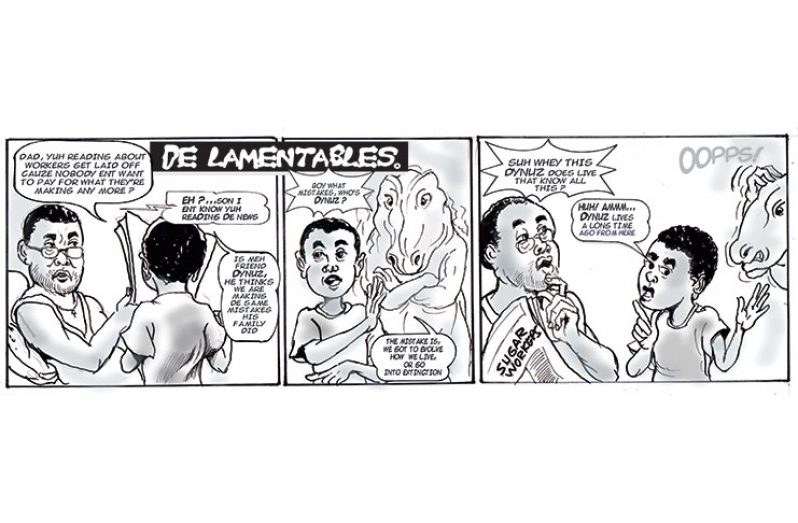THE politics of Guyana from its inception has gathered few men of ideas and they have had to wrestle with their subordinates and superiors to expand from the regimentation of politics to the fringes of the wider realm of economic and cultural progress. Forbes Burnham shaped modern Guyana not without defiance. He broke the social and colonial status quo and the political status quo emerged in swift mimicry, only that his vision extended too far that they could not reverse what and where his extensions had reached, though no stone was left unturned to malign and crucify his being and legacy, even today.
However, in 2018 we more than less eat what we grow, we want to own our homes here and we want to develop our ideas here- the latter is where the problem begins. Because when the current President spoke of the curse of the ‘Six Sisters’ he attracted ridicule and condemnation, he was, however, reflecting on the stagnant dependency on the national industries we had inherited In 1966, to which we have added and sustained little. In a chat with my buddy on America Street, we explored the usual state of economic movement in our communities and the slow efforts to purge platforms that were callously encouraged like money laundering etc. The blind eyes turned to every depraved new creed that became institutionalised that in the process took human lives and retarded our value system, by at least 50 years into a non-innovative mode.
Guyana entered the economic world scene through independence that was and still is controlled by financial institutions that were developed after WWII to gather third world nations, naive enough not to recognise that they were serving institutions that were the equivalence of ‘Loan Sharks’ designed to nullify that celebrated independence, especially in the context of the ‘Cold War’. In the Guyana scene, many with political approved academic excellence were placed at the head of economic institutions but lacked the vision to quickly recognise the economic potential that emerged through the initiatives of talents that their learning had not equipped them with ready templates for, though precedents existed, that with a phone call they could have designated a subordinate to research the potential of, while designating another to gather published information on the subject as a cross-check source.
Ras Dalgetty explained the uphill battle to convince Haslyn Parris at Linden that a specific by-product of the Linden operations qualified to launch a ceramic industry, in the end the highly qualified politician could not envision what was promoted by his chemists and science staff and it never happened. Where is our economic research library that would today include ‘Digital’ on alternative industries, whose fledgeling potential is evident in the society, from The Cultural Industries to the Industrial arts? Also, neither is there an entity to facilitate any query with competent personnel. That no such entity or facility exists confirms where we have erred so far.
The political outcry of the decline and present state of the Sugar Industry is uncalled for because the data of the gradual economic reality of sugar over the past 30 years that heralded the inevitable collapse was staring us in our faces. Guyana knew that if resources were not condensed and gradually redirected into other areas, we would not be where we are today. Thus the politicised self-righteous foolishness that entered the media further degraded my respect for people who seemed more inclined to jump on a popular wagon rather than offer solutions. These were people who I had thought could offer rational guidance by their years in politics and public life- possibly I have grown past them.
Troubling is the criteria for employment. People are employed in Guyana based on how expedient it is to offer employment and not on their capacity to function in the specific areas, dummy girlfriends get a squeeze in and as ‘Rambo Gaskin’ said a man was placed on the Board of a public entity who was illiterate because he was the Party leader’s driver. The man told him “Tell meh when fo seh yes and no”. There the politics transcended the rational thinking of the significance of the Board in a prolonged system of a
counterproductive political culture. This reference is not unique. In a more recent case, I appealed to a friend about an official who had employed persons who had no knowledge of the portfolio the official held. He explained to me that the official needed to have trusted people around. He then proceeded to explain how untrustworthy staff can undermine and sabotage the daily functions of an entity. Well, in that case, the clueless employee becomes the lesser of the two evils. The only way to proceed is to place laws that enforce responsibility and accountability through finale consequences.
We keep losing categories of employment. Up to the late 70s every morning the post office front was occupied by dozens of office assistants in their lily white shirt jacks exchanging mails. They represented the entire public sector. Computers erased the majority of those jobs. The same happened to the Stevedores with the modernisation of global merchant shipping. The Web and offset printing facilities lost hundreds of jobs due to computer compatible printing. Bauxite and now Sugar fall into that global separation between evolution and the obsolete. The business of the talents, skills, the creative and innovative ideas of the people must become relevant. We have no choice because the separation mentioned, also applies to the sovereignty of nations.




.png)









